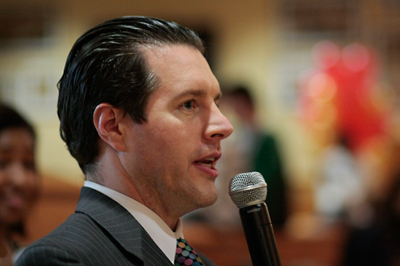As I’ve watched our community cope with the loss of four undergraduate students, I have been struck by the strength and resilience demonstrated by the GW community. It has made me very proud to be a Colonial.
However, I cannot help but attend to the range of emotions I’ve been feeling, particularly as I reflect on the memory of my own parents, who both died suddenly just months apart a few years ago.
Those who study grief often point to signs of guilt, frustration and helplessness. I’ve felt each of these emotions during parts of the past two weeks. I have struggled to understand how this happened and what more could have been done. I’ve experienced fatigue and had difficulty concentrating. I’ve been more anxious, worrying about another incident — all signs of stress associated with loss.
I’m aware that all of these feelings and emotions are normal, and while my sadness for our students still exists, it seems to be getting a little better every day.
Since there is no right way to grieve, some of the best advice I received – which helped me endure the pain of my parents’ untimely deaths – was to seek out the support that worked best for me. And while the road to a healthy mental state is not a one-size-fits-all model, asking for help and seeking support is a sign of wisdom, courage and strength. It is the foundation upon which your life is built, and should be treated promptly and as seriously as you would a broken arm or any other injury.
For me and for many others, seeking out someone to talk to is the right path to take. Fortunately, at a place like GW, there are lots of counseling services available, both on campus and across the city – for students as well as staff.
All of the emotions of the past two weeks led me to encourage my staff in the student affairs office to connect with a clinician through our Employee Assistance Program. It was a simple step that helped a lot of us put things back into perspective and start the healing process.
I also encourage you to pay attention to the little things like eating right, working out, getting enough sleep and spending time with friends and loved ones. But don’t set unrealistic expectations – there is no timeline for mourning, so don’t be afraid to ask for an extension or take a break if you need it. Your professors or academic adviser can assist you in finding ways to get the support you need, now and far into the future.
I know that profound feelings of sadness can often linger. While it’s been seven years since my parents died, my grief has given me a much greater appreciation for the everyday beauty in life. I have realized that keeping memories of my parents close make coping just a little easier.
As you go forward, whether you seek out the comfort of good friends and family or the support of a caring clinician, please take the time to reflect on those things for which you are thankful. Reach out to others for support and draw strength from the GW family of which we are all a part.
Peter Konwerski is a vice provost and the dean of student affairs.





